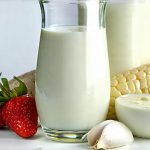Gastroesophageal reflux disease (GERD) impacts millions, causing discomfort ranging from mild heartburn to debilitating pain. A cornerstone of managing GERD often involves dietary adjustments, as certain foods can exacerbate symptoms. Dairy is frequently cited as a trigger for many individuals experiencing GERD, but the reasons are complex and don’t apply universally. The high fat content in whole milk products can relax the lower esophageal sphincter (LES), allowing stomach acid to creep upwards. Lactose intolerance, common even among adults, can also contribute to digestive distress that mimics or worsens GERD symptoms. However, eliminating all dairy isn’t necessarily the answer – it’s about finding alternatives that minimize irritation and support comfortable digestion.
Many people find relief by switching from traditional dairy to plant-based alternatives. The good news is the market has exploded with options beyond just soy milk! From almond and oat milks, to coconut yogurt and cashew cheeses, there’s a wide range of choices available. But navigating these options can be tricky when you’re trying to minimize GERD triggers. Some alternatives are more acidic than others, some contain added sugars or thickeners that could cause bloating, and some simply don’t offer the same nutritional profile as dairy. This article will explore some of the best dairy alternatives for people with GERD, focusing on factors like acidity, fat content, potential allergens, and overall digestibility to help you make informed choices. We’ll also discuss how to identify your personal triggers and tailor your diet accordingly. Considering a tailored approach is often beneficial, and understanding best diet can provide further support.
Understanding Dairy & GERD Triggers
The connection between dairy and GERD isn’t straightforward. It’s not about dairy itself being inherently bad; it’s about how it interacts with individual digestive systems. Whole milk, for example, is high in fat – a primary trigger for many with GERD because fat slows down stomach emptying and increases acid production. This prolonged stomach distention puts pressure on the LES, increasing the likelihood of reflux. However, lower-fat dairy options like skim milk or non-fat yogurt are less likely to cause issues for some people.
Lactose intolerance also plays a significant role. If your body lacks sufficient lactase (the enzyme needed to digest lactose), undigested lactose ferments in the gut, leading to gas, bloating, and discomfort that can mimic GERD symptoms or even worsen existing reflux. This isn’t the same as a dairy allergy; it’s a digestive issue. Therefore, individuals with lactose intolerance might find relief by switching to lactose-free dairy products or exploring plant-based alternatives. It’s crucial to remember that everyone is different. What triggers one person may not bother another, so careful observation and experimentation are key. Safe alternatives can often provide relief without sacrificing nutrition.
Finally, certain additives in dairy products – like carrageenan or guar gum – can also contribute to digestive issues for some individuals, potentially exacerbating GERD symptoms. These are often added as thickening agents and stabilizers, but they aren’t universally well-tolerated. Reading ingredient lists carefully is vital when selecting both dairy and non-dairy options.
Plant-Based Milk Alternatives: A Detailed Look
When choosing a plant-based milk alternative, several factors come into play beyond just avoiding lactose. Acidity levels are paramount – more acidic beverages can irritate the esophagus. Oat milk generally ranks among the least acidic options, making it a good starting point for many with GERD. Almond milk is relatively neutral but can sometimes cause bloating due to its fiber content. Soy milk, while nutritious, has a slightly higher acidity and can be problematic for some. Coconut milk tends to be lower in acidity, but its high fat content (even in reduced-fat varieties) needs consideration.
- Oat Milk: Often the best tolerated due to low acidity and creamy texture. Look for unsweetened versions to avoid added sugars.
- Almond Milk: A good option if you don’t experience bloating from fiber. Choose unsweetened, unflavored varieties.
- Soy Milk: Nutritious but potentially more acidic; monitor your symptoms carefully.
- Coconut Milk: Lower acidity but higher fat content – use in moderation or choose reduced-fat options.
- Rice Milk: Generally well-tolerated, low in fat and allergens, but also lower in protein.
It’s important to note that many plant-based milks contain added ingredients like thickeners (gums) or sweeteners. These can cause digestive upset for some individuals. Always read the label carefully. Some brands offer “cleaner” versions with minimal additives. Experimenting with different brands and formulations will help you determine what works best for your body. Focusing on plant-based milks can significantly ease digestive discomfort.
Navigating Plant-Based Yogurt & Cheese Alternatives
Yogurt alternatives present a unique challenge because traditional yogurt’s probiotic content is often beneficial for gut health, which can indirectly improve GERD management. When switching to plant-based yogurts, look for options that incorporate probiotics – coconut yogurt and almond milk yogurt frequently offer this benefit. However, be mindful of added sugars and thickeners. Coconut yogurt, while delicious, tends to have a higher fat content than other alternatives, so it’s best consumed in moderation.
Plant-based cheeses are even trickier. Many commercially available options contain ingredients like carrageenan or modified food starch that can cause digestive issues. Cashew-based cheeses often offer the most satisfying texture and flavor but can be high in fat. Look for brands using minimal ingredients and focusing on whole-food bases (like cashews) rather than heavily processed alternatives. A good approach is to use small amounts of plant-based cheese as a flavoring agent, rather than relying on it as a significant part of your diet.
Identifying Your Personal Triggers & Building a GERD-Friendly Diet
The key to managing GERD through dietary changes isn’t about universally avoiding certain foods; it’s about identifying your personal triggers. Keeping a food diary can be incredibly helpful. Here’s how:
- Record Everything: Meticulously document everything you eat and drink, including portion sizes and ingredients.
- Track Symptoms: Note any GERD symptoms – heartburn, regurgitation, bloating, etc. – along with the time they occur.
- Look for Patterns: After a week or two, analyze your diary to identify potential correlations between specific foods or beverages and your symptoms.
This process can help you pinpoint which dairy alternatives (or other foods) are causing issues. Don’t be afraid to experiment! Try different brands, formulations, and portion sizes. Consider these additional tips:
- Small, Frequent Meals: Eating smaller meals more often reduces pressure on the LES.
- Avoid Late-Night Eating: Give your body time to digest before lying down.
- Stay Hydrated: Water helps neutralize stomach acid.
- Limit Carbonated Beverages & Caffeine: These can both exacerbate GERD symptoms.
Bold statement: Remember, dietary changes are just one part of managing GERD. If you’re experiencing persistent or severe symptoms, consult with a healthcare professional for proper diagnosis and treatment. They can help you develop a personalized management plan that addresses your specific needs. Cultivating compassion practices is also key to navigating chronic illness. Additionally, incorporating regular exercise tips can further support overall well-being and symptom management. Prioritizing sleep tips is also vital for digestive health. And finally, remember to check if coconut is safe for your specific allergies.


















